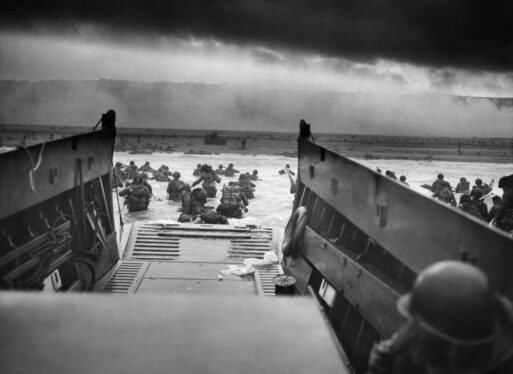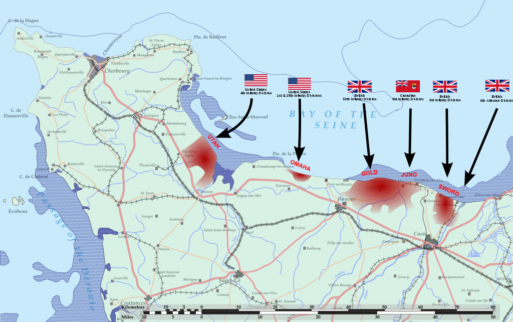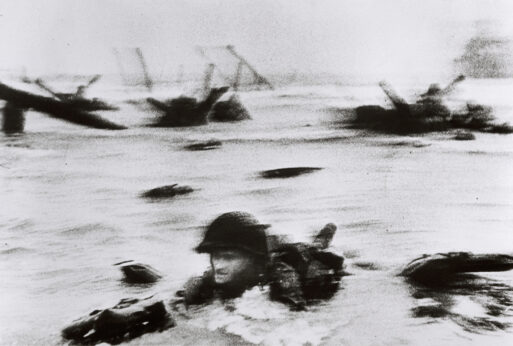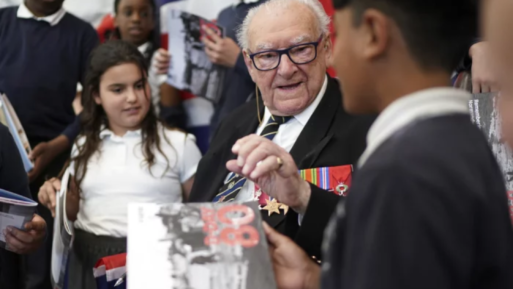
“Into the Jaws of Death — U.S. Troops wading through water and Nazi gunfire. June 6, 1944” From Records of the U.S. Coast Guard (NAID 355)
Credit: nationalww2museum.org
On June 6th, 1944, land, air and sea forces of the allied armies embarked upon the largest amphibious invasion in military history. Commonly remembered as D-Day, the daring invasion was instrumental in finally bringing German Nazi forces to its knees. This year marks the 80th anniversary of this infamous battle, and the few remaining veterans who were there are feeling compelled to share their stories while they’re still around. Here’s why more people need to make an effort to listen.
What Happened on D-Day? A Very Brief History
D-Day marked the opening of the long-awaited second front in the war against Nazi Germany. In the early hours of June 6th, 1944, almost 160,000 Allied troops landed on the Normandy beaches or parachuted behind enemy lines. Given the codename Operation OVERLORD, the invasion suffered incredible losses; at least 4,414 troops were killed and another 5,900 were listed as missing or wounded as they strove to break through the Nazis’ heavily fortified “Atlantic Wall,” a 2,400-mile line of obstacles including mines, concrete bunkers and tank ditches.

Operations Greenwood and Pomegranate Normandy July 1944 EN.svg: Philg88
By the end of August, more than 2 million forces from 12 Allied nations had crossed the English Channel to land on Normandy, starting the march to Berlin that ended with Germany’s surrender on May 8, 1945.
Reducing the bravery of these troops to a series of statistics fails to properly convey the horrors they endured on D-Day. Americans were packed like sardines into flat-bottomed Higgins boats launched from troop transports 10 miles from the French coastline. Vomit and sea water filled the bottoms of the boats as they crossed, and men were forced to bail the disgusting sludge with their helmets. Then, when they finally reached land they had to leap from their landing boats into a ceaseless barrage of machine-gun fire from where the Germans had positioned defenses along the cliffs. Omaha Beach — one of the five beaches marked for invasion – saw the fiercest fighting, with over 2,400 soldiers killed, wounded or missing out of the approximately 34,000 who came ashore that day.

D-Day: June 6, 1944: Allied Invasion of Normandy
Credit: Robert Capa
Movies like “Saving Private Ryan” Can Only Tell Part of the Story
In cinema, the experience was most memorably depicted in Steven Spielberg’s “Saving Private Ryan.” The film opens with an unflinching 23-minute long depiction of the invasion of Omaha Beach; we follow soldiers as they witness their compatriots getting mowed down by machine gun fire, men screaming with missing limbs and crying out for their mothers. Many veterans and historians have attested that the harrowing scene is the closest any movie has ever gotten to showing what the war was really like.
But the movie only tells one story. In order to truly convey all of the atrocities that occurred – to prevent history from repeating itself – we need to preserve as many individual histories as we can.
Why We Should Listen to The Last of the Greatest Generation
According to a recent article from NPR, less than 1% of the 16.4 million Americans who served in the armed forces during World War II were still alive at the end of last year. The U.S. Veterans Administration estimates that of those 1%, 131 of them are dying every day. Rob Citino, a senior historian at the National WWII Museum in New Orleans said, “The actuarial tables tell us that pretty soon there won’t be [surviving members left of that] generation. And I think this 80th is the last round year in which we will actually be able to celebrate in the presence, and with the wisdom of, the veteran generation that actually fought the war.”

D-Day veteran and Ambassador for the British Normandy Memorial Ken Hay speaks to children during a visit to Rush Green Primary School in Dagenham, England.
Credit: Gareth Fuller/AP
What we will lose is the subjective viewpoints from history that make it feel real. In the NPR article, British Army veteran Ken Hay, now 98, says that he visits schools whenever he can to tell his story, so the battle to liberate France and defeat Nazi Germany doesn’t become a dusty relic of history. “While we are around, we vets – and we’re a diminishing crew, of course – we are a tangible interpretation of what they read in the books, what they’ve heard from their parents, what their parents remember their grandparents saying,” he said. He feels compelled to reach out to younger generations in order to leave the message that “there must be a way, other than war, to resolve difficulties.”
The sad truth is that no matter how gritty the depiction, when history is told for the purpose of entertainment – like “Saving Private Ryan – it inadvertently glorifies what really happened. Hay wants future generations to benefit from his and other veterans’ stories in order to glorify something else: Love.
“If you love yourself, if you love your family, if you love your friends, if you love the people you met yesterday, and the people you meet today and the people you’re going to meet tomorrow… If we could all do that, there would be no wars.”

 D-Day Veterans Seek To Keep Their Stories Alive
D-Day Veterans Seek To Keep Their Stories Alive


 How Dare You Die Now!
How Dare You Die Now!

 “Help Me, Helen”
“Help Me, Helen”














